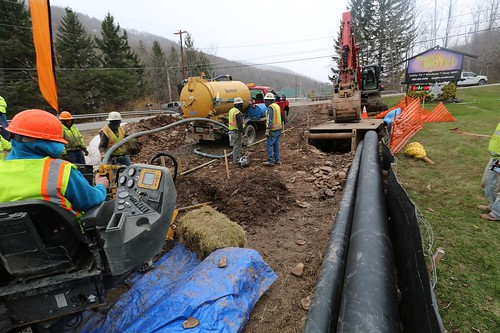FOR IMMEDIATE RELEASE 17-99 NYC DEP Completes Project to Expand Sewer Lines in Town of ShandakenThe New York City Department of Environmental Protection (DEP) today announced the completion of work on a $2.2 million sewer line extension project in the Town of Shandaken. The project will provide centralized wastewater collection and treatment to additional homes and businesses that currently rely on individual septic systems. “Decades of data tell us that the proper collection and treatment of wastewater from our watershed is among the most important actions New York City can take to protect the quality of drinking water in its reservoirs,” DEP Commissioner Vincent Sapienza said. “This project in Ulster County will enhance our protection of Ashokan Reservoir while providing local homeowners and businesses with an important utility of their own.” “The Town of Shandaken is pleased to have had the opportunity to support in providing free sewerage to numerous homes and businesses in our community who previously were utilizing septic systems,” Shandaken Supervisor Robert A. Stanley said. “This municipal system, while being more environmentally friendly, provides these property owners with peace of mind knowing that they and future owners will never have to be burdened with the replacement of a privately owned system. We are grateful to DEP for providing this opportunity to our community.” The project included the installation of approximately 3,600 linear feet of sewer mains along both the north and south sides of Route 28, adjacent to the City’s Pine Hill Wastewater Treatment Plant. DEP also installed approximately 3,600 linear feet of laterals from the sewer main to the foundations of 17 homes and four business that are served by the extension. Town of Shandaken officials have notified property owners along the route that they can now make arrangements to decommission their septic tanks and connect to the laterals that were installed on their properties. Wastewater collected by the extension will be processed at the Pine Hill Wastewater Treatment Plant, which is owned and operated by DEP. The extension in Shandaken is part of a broader effort by DEP to expand existing wastewater collection systems in the watershed over the past 20 years. Since 1997, the City has spent more than $18 million on new infrastructure to connect more than 200 watershed homes and businesses to wastewater treatment plants. DEP manages New York City’s water supply, providing more than 1 billion gallons of high-quality water each day to more than 9.5 million New Yorkers. This includes more than 70 upstate communities and institutions in Ulster, Orange, Putnam and Westchester counties who consume an average of 110 million total gallons of drinking water daily from New York City’s water supply system. This water comes from the Catskill, Delaware, and Croton watersheds that extend more than 125 miles from the City, and the system comprises 19 reservoirs, three controlled lakes, and numerous tunnels and aqueducts. DEP has nearly 6,000 employees, including almost 1,000 scientists, engineers, surveyors, watershed maintainers and other professionals in the watershed. In addition to its $70 million payroll and $166 million in annual taxes paid in upstate counties, DEP has invested more than $1.7 billion in watershed protection programs—including partnership organizations such as the Catskill Watershed Corporation and the Watershed Agricultural Council—that support sustainable farming practices, environmentally sensitive economic development, and local economic opportunity. In addition, DEP has a robust capital program that will create up to 3,000 construction-related jobs per year. For more information, visit nyc.gov/dep, like us on Facebook, or follow us on Twitter. | ||
